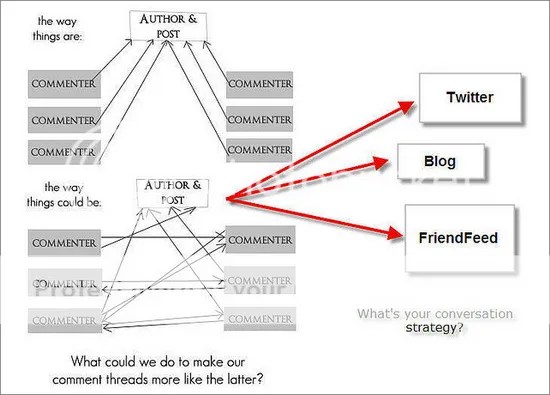Reading blog comments can be painful. For every insightful and well thought out post there are at least 10 spammers, trolls and illiterate shrieking banshees just looking to start a fight. This is hard enough when you are a visitor trying to shift through all the garbage to find the occasional diamond to respond to. But it is an impossibly frustrating task when you are the blog owner or writer, and you are forced to find those that actually offer you something decent to work with.
Worse is when a flame war breaks out, and there are always plenty of offensive, obscenity-filled, bigoted or otherwise negative comments you have to decide to either keep or delete. This isn’t a simple decision when you are trying to keep an open and yet friendly place for visitors to share their thoughts and opinions.

Image Credit: 1
Usually when I give bloggers a rule of thumb on this issue, I tell them this: If it doesn’t contribute anything to the conversation, it isn’t necessary. If you have a bunch of posts only written by spammers to share websites, they don’t add anything to the discussion. If you are reading endless posts by a troll who is insulting the reader base or blog with no specific focus or reason, they are not giving you something to think about. These comments don’t belong there.
But sometimes deleting such things can cause even more havoc as they begin to point it out. Which is why it helps to have guidelines you can direct anyone to prior to the comments being posted. These set of rules should lay out what won’t be tolerated and what you will do in the case of such violations.
Creating a Comment Policy
What Problems Are Obvious?
To start writing this section, you should take a look through your posts and see what things you find that bother you. Make a list of what you won’t allow to continue. This will give you the baselines for the rules.
What Will You Do About It?
Next, come up with a system for mild, moderate and severe violations. For instance, say you have a spammer who is posting genuine comments, but putting keywords into their names and obviously sharing links. Maybe you decide to delete the comments. But if they come back with nothing but copy/paste and irrelevant comments, you ban the IP address.
Another example is for trolls: If you have someone who is causing trouble, you can delete the comment and give a warning for a mild infraction. If they continue give them a temporary ban, and if they still persist or step over a line, ban them permanently.
How Will You Present It?

Image Credit: 2
For the actual comment policy page you have two options: professional or personable. I have seen both used to great effect. The first requires you to give a dry rundown of your general policy, just stating that you reserve the right to delete comments or bad members for certain offensive acts. The other is a lengthier page explaining why you have chosen to come up with a comment policy in the first place. I prefer the latter.
Should Comments Be Moderated?
If you want to make sure your policy is strictly enforced, you can choose to approve or deny comments prior to publication. Of course, this takes a lot of effort and time. To get around this you can apply a spam filter to aid you. Or, if you have several people working for the site, you could just have them cover the comments on their own pieces.
Conclusion
So, should you have a comment policy? Yes. People have a tendency to push social boundaries online they wouldn’t in person, due to the anonymity and the feeling of protection from behind their keyboard. Most act responsibly, but there are plenty who do not. It is best to filter them out for the sake of pleasant and productive commenting, rational feedback and criticism and lively (levelheaded) debate.
Guest Author Olivia blogs for PsPrint, an online printing company specializing in brochure and poster printing among other popular services. Follow PsPrint on Twitter and Facebook